Jadathomas
On this page, you find all documents, package deals, and flashcards offered by seller jadathomas.
- 5
- 0
- 0
Community
- Followers
- Following
5 items
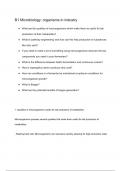

Biotechnology Revision Questions
These revision questions cover a broad range of topics within biotechnology, including genetic engineering, recombinant DNA technology, agricultural biotechnology, medical applications, environmental biotechnology, ethical considerations, fermentation, DNA sequencing, stem cells, gene editing, biosensors, protein engineering, nanobiotechnology, DNA fingerprinting, and current trends in the field. They aim to test and reinforce your understanding of key concepts in biotechnology and prepare you f...
- Book
- Exam (elaborations)
- • 21 pages •
These revision questions cover a broad range of topics within biotechnology, including genetic engineering, recombinant DNA technology, agricultural biotechnology, medical applications, environmental biotechnology, ethical considerations, fermentation, DNA sequencing, stem cells, gene editing, biosensors, protein engineering, nanobiotechnology, DNA fingerprinting, and current trends in the field. They aim to test and reinforce your understanding of key concepts in biotechnology and prepare you f...
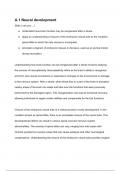

Neurobiology Skills
The nervous system is a complex network of specialized cells called neurons, which are the fundamental building blocks of the nervous system. Neurobiology seeks to unravel the mysteries of how neurons communicate with each other and how this communication gives rise to various behaviors, thoughts, emotions, and cognitive processes.
- Book
- Exam (elaborations)
- • 21 pages •
The nervous system is a complex network of specialized cells called neurons, which are the fundamental building blocks of the nervous system. Neurobiology seeks to unravel the mysteries of how neurons communicate with each other and how this communication gives rise to various behaviors, thoughts, emotions, and cognitive processes.
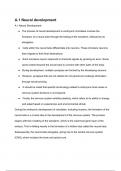

Neurobiology Notes
Neurobiology, also known as neuroscience, is a branch of biology that focuses on the study of the nervous system, including its structure, function, development, and disorders. It is an interdisciplinary field that draws from various scientific disciplines, including biology, chemistry, physics, psychology, and computer science, to understand the complex workings of the brain and nervous system.
- Book
- Exam (elaborations)
- • 21 pages •
Neurobiology, also known as neuroscience, is a branch of biology that focuses on the study of the nervous system, including its structure, function, development, and disorders. It is an interdisciplinary field that draws from various scientific disciplines, including biology, chemistry, physics, psychology, and computer science, to understand the complex workings of the brain and nervous system.
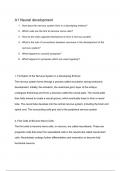

Neurobiology Revision Questions
These revision questions cover various aspects of neurobiology, including neuronal structure and function, neurotransmission, brain organization, sensory systems, motor control, and the autonomic nervous system. They aim to assess and reinforce your understanding of key concepts in neurobiology and prepare you for exams or further study in the field.
- Book
- Exam (elaborations)
- • 20 pages •
These revision questions cover various aspects of neurobiology, including neuronal structure and function, neurotransmission, brain organization, sensory systems, motor control, and the autonomic nervous system. They aim to assess and reinforce your understanding of key concepts in neurobiology and prepare you for exams or further study in the field.
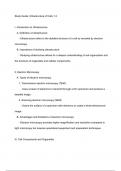

Introduction to Cells 1.1
Cell theory states that all organisms are made of cells. This is true in most cases but there are some notable exceptions, like skeletal muscle. This topic covers the cell theory, the exceptions to cell theory and how cells differentiate during cell growth. Using microscopes is part of the topic, as is measuring the size of cells.
- Book
- Interview
- • 6 pages •
Cell theory states that all organisms are made of cells. This is true in most cases but there are some notable exceptions, like skeletal muscle. This topic covers the cell theory, the exceptions to cell theory and how cells differentiate during cell growth. Using microscopes is part of the topic, as is measuring the size of cells.
